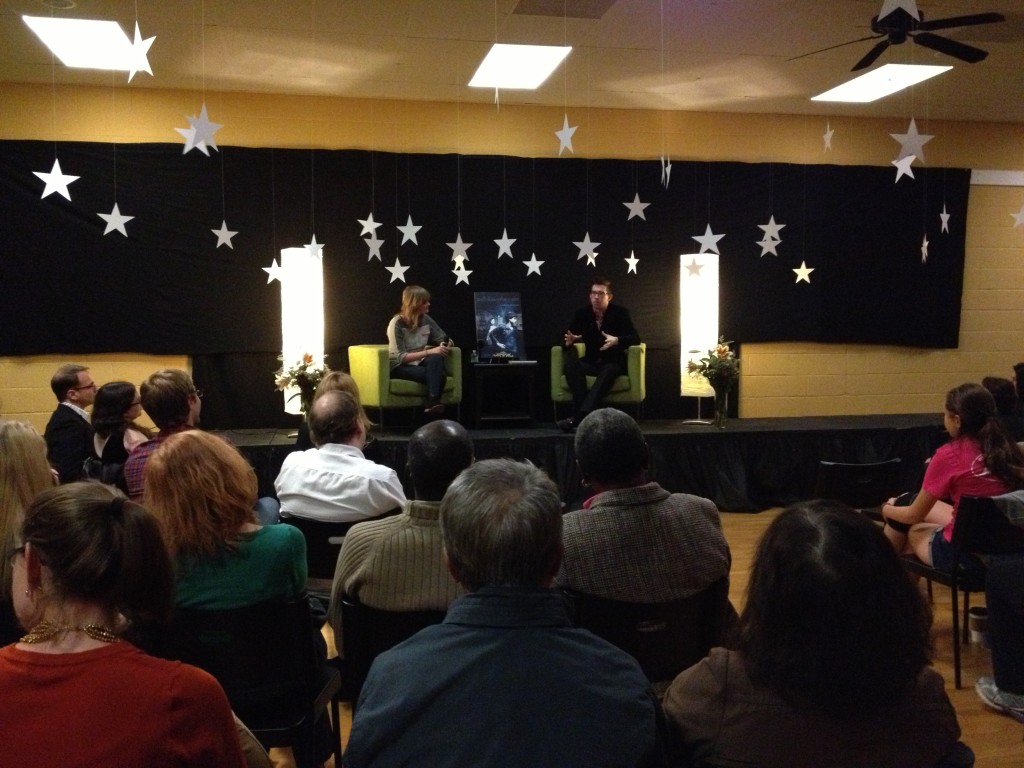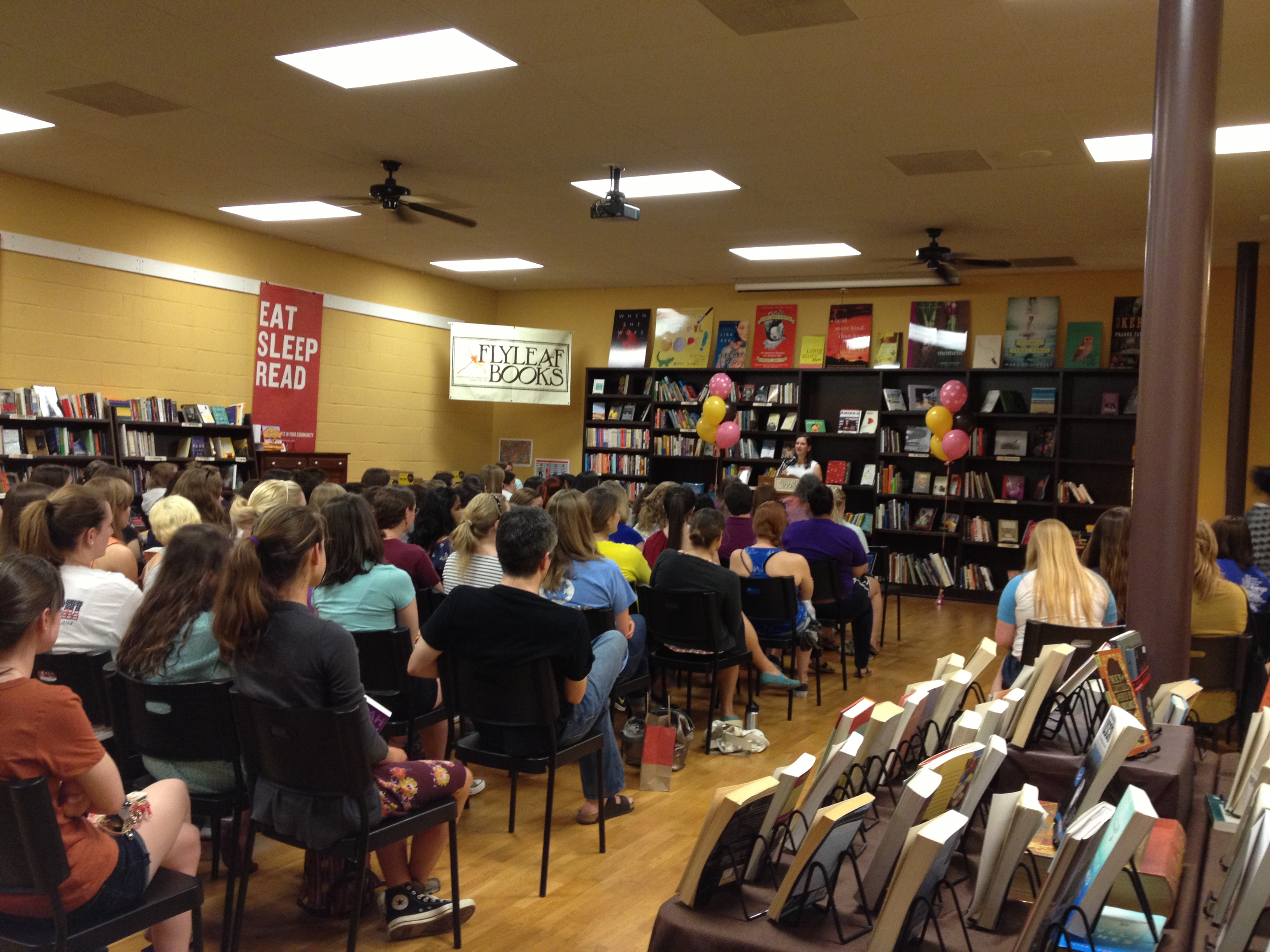Photo: Chapel Hill local and YA author Sarah Dessen at a reading at Flyleaf Books
Flyleaf Books is located in Chapel Hill, North Carolina and hosts hundreds of authors a year. When we asked marketing coordinator Linnie Green to write a piece for LARB, there was no hesitation on the topic. “Rumor has it that if brick-and-mortar bookstores disappear,” she warns, “Amazon plans to institute a mandatory uniform of silly hats and uncomfortable tweed trousers.” How to avoid this fate? Authors, make sure to team up with local bookstores.
By Linnie Greene
The movie Field of Dreams gave us the adage“If you build it, they will come.” Someone should have let the critics and naysayers know. Opening a bookstore in a recession, during an era when e-readers and screens are changing the way many people ingest words, is one of those bold moves that indicates either insanity or a big trust fund. Flyleaf Books had neither (although insanity, I guess, is relative). All any of us bring to the table is absolute devotion to words on paper, to the smell of ink on pages, beautiful dust jackets, and deckled edges.
When we built “it,” “they” came: the writers, of every stripe and type and genre, every caliber and region. As Flyleaf approaches its fifth year, the only change has been the volume. More event requests come through our doors or inboxes than ever before, so that now, during our busiest seasons, we’ve got four to six events per week.
An independent bookstore exists because it must; a community needs a space for its brightest thinkers to light up a room instead of a screen. With a small staff and a limited budget, we do our very best to make sure that every reading gets its due, whether that’s a litany of tweets or a paid newspaper ad. Still, with so many cards in the deck, there’s only so much time we can dedicate to marketing any particular night. Authors: that’s where you come in.

Ours is a symbiotic relationship, and like fig trees and fruit bats, our necessary work can only happen together. With that in mind, I’ve assembled a list of the things that you, an author, can take on before a reading at an independent bookstore. There are never guarantees (why is it that people won’t drive when it’s raining?), but there is the chance of filling one or two or twelve more chairs.
1. List the event on your website and social media outlets.
Not every author needs a Twitter (we’ll pause here so everyone can breathe a collective sigh of relief). Every author needs some sort of arsenal, though: a newsletter, a blog, a Facebook page, a few friends you can email who you know will show up wherever, whenever. A combination of two of three of these things is ideal, but regardless of what sort of megaphone you choose, shout into it. Make sure that you’re listing events as soon as you book them, and begin to think about specific people you might invite. In Chapel Hill, the Little College Town of 1,000 Writers, getting a UNC professor to notice your event goes a long way. Ask the bookstore about their commitments — will they get in touch with bookclubs? — and then do your best to cover the difference.
2. Get in touch with local media outlets.
At Flyleaf, we do this already, but on a larger scale — for the most part, when we email members of the press, it’s with a menagerie of events coming up over the next few weeks or months. Yours might stand out; it might not. The best way to guarantee that your reading gets its due spotlight in local publications is to contact journalists directly, with as much context as you can gather about what types of coverage their outlet usually provides. The easiest way to get a list of local contacts is to get in touch with the bookstore where you’ll be reading. If that doesn’t work, Google arts and entertainment coverage in whatever area you’ll be visiting and plug away. You’d be surprised how far a personal message can go, especially if it doesn’t reek of self-promotion. Keep it light and pressure-free, but let journalists know that you’ll be in town and you might be the Next Big Thing.
3. Remember that any bookstore worth its salt is rooting for you.
That’s right. Even if we can’t recite a passage from your book (speaking personally, my “to be read” stack is just out of control), we wouldn’t have booked an event with you if we didn’t want you to succeed. Sometimes we have an unlucky night: there’s flash flooding, it’s beautiful and everyone’s outside Instagramming the sunset, or we didn’t realize when we booked the reading five months ago that the local college basketball team would be in the Final Four (we’re loyal Tarheels, but our allegiance to collegiate sports wears thin when it comes down to spring readings). Even if no one shows up, we’re rooting for you. We don’t exist without you. Yeah, that’s right: without authors, bookstores are absolutely pointless. Without bookstores, authors are Amazon’s minions, and rumor has it that if brick-and-mortar bookstores disappear, Amazon plans to institute a mandatory uniform of silly hats and uncomfortable tweed trousers. None of us wants that.
4. Cap your reading at 30 minutes, then leave time for questions or conversation.
However you want to format it, the point is: there are extraordinarily few occasions in which it is appropriate to read an entire chapter of your book aloud. Even if your novel or memoir has been out for months, treat the event like an extended, in-person trailer. Assume there are audience members who are completely oblivious to the plot. You’re dropping the hook into the water and hoping the audience bites (a bite, here, is a book sale). Don’t tell them how Dumbledore dies. Try your best to find a succinct, stand-alone scene, read that, then supplement it however you choose. Here, we do Q&As (grouping up with a local author almost always ensures a better turn-out!), multimedia presentations, or fireside-chat style conversations.
5. Encourage your audience to buy the book!
Many of you will be surprised, but this really needs to be on the list. It might be the most important thing on the list. Independent bookstores aren’t necessarily slobbering capitalist monsters, but the truth remains: we need to pay our rent. To pull off an author event, we need to keep the lights on, staff the store, and stock up on inventory. Pricing differs from store to store, but the vast majority of our readings are technically (if not actually) free: would-be readers aren’t committed to buying a book before they come in the door. Incentivize them! Mention, briefly, that the books are available at the cash registers, and that even if folks already own X, they could buy Y or Z! Please, for the love of God, when you mean e-reader, don’t say “Kindle.” Don’t give away copies of your book for free. Publishers big and small like to see that book tours make financial sense. Often, they’ve invested their equally hard-won resources in sending you on the road, or you’ve taken on the expenses yourself. Sell some books. Make this thing worth your while (and ours).
To learn more about Flyleaf Books and their events, check out their website here.
LARB’s Naked Booksellers Program is a collaboration with independent bookstores to help tell their stories and broaden their visibility across the country and around the world. If you are a bookseller interested in participating, or know of a bookstore you think we should be talking about, please contact [email protected]. For a complete list of participating stores, please visit our Naked Bookseller Tumblr page.


